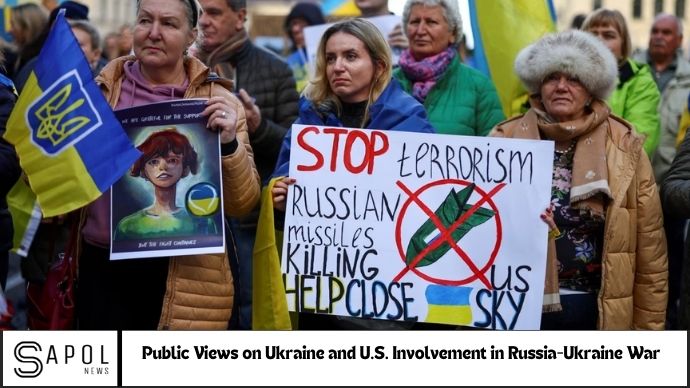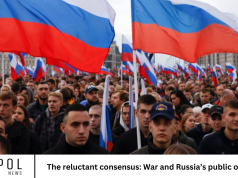Public Views on Ukraine and U.S. Involvement in Russia-Ukraine War The Russia-Ukraine war has created a deeply divided global landscape, with public opinion varying greatly about the role of the United States in supporting Ukraine. While many Americans view the conflict as a critical geopolitical challenge, there are significant differences in how the U.S. should engage. With the war entering its third year, what do the latest polls tell us about how the U.S. public views the situation in Ukraine? And how do those opinions influence U.S. involvement moving forward?
U.S. Views on Support for Ukraine
Approximately 31% of Americans now believe the U.S. is providing too much support to Ukraine, a significant increase from just 7% in March 2022, right after Russia’s invasion. Meanwhile, 25% feel the support is just right, and 24% think it’s insufficient. Around 18% of Americans remain unsure.
In March 2022, nearly 42% of Americans thought the U.S. wasn’t doing enough to help Ukraine, a view that has since dropped by nearly 20 percentage points. The shift reflects growing concerns over the extent of U.S. involvement, as more people now question the level of support being offered.
Partisan Differences on U.S. Support for Ukraine
The partisan divide is evident. Half of Republicans and Republican-leaning independents (49%) believe the U.S. is giving too much aid to Ukraine, compared to only 16% of Democrats and Democratic-leaning individuals. In contrast, 36% of Democrats now think the U.S. isn’t providing enough support—an increase from 24% in November 2023.
Among Republicans, conservative Republicans are more likely to oppose Ukraine aid (54%) than moderate or liberal Republicans (40%). Similarly, liberal Democrats (11%) are less likely to think the U.S. is providing too much assistance compared to conservative and moderate Democrats (54%).
Younger Americans from both parties are also more likely to say that the U.S. is providing excessive support and to express uncertainty on the matter.
Concerns About Russia’s Expansion and Ukraine’s Future
Concerns over Russia’s potential to defeat Ukraine have been rising, with 44% of Americans extremely or very concerned about a Russian victory and takeover of Ukraine. This marks a 6% increase since September 2022 but remains below the 55% who held similar concerns in April 2022. The rise in worry is especially notable among Democrats, where 55% express strong concern, up by 10 percentage points since the previous year.
Republicans show less concern, with only 35% deeply worried about a Russian victory. Liberals are notably more concerned than conservatives and moderates on both sides of the political spectrum.
Worries About Russia Invading Other Countries
Americans are also more concerned about the possibility of Russia invading additional countries in the region. 48% of Americans now express extreme concern about this threat, an increase from 41% in September 2022. However, this is still lower than the 59% who were concerned early in the war, in April 2022.
The concern is especially high among liberal Democrats, with 58% extremely or very worried, compared to 41% of conservative Republicans. Additionally, older Americans (ages 65 and older) are more likely to be alarmed by Russia’s potential actions, with 61% expressing deep concern, compared to 41% of younger adults under 30.
U.S. Support for Ukraine: A Divided Landscape
As of early 2024, surveys show that Americans remain divided in their support for Ukraine, despite overwhelming international sympathy for Ukraine’s sovereignty. According to a recent University of Maryland poll, 62% of Americans expressed sympathy for Ukraine, with an even higher number of Democrats supporting Ukrainian resilience against Russian aggression. However, partisan differences are evident. While 76% of Democrats sympathize with Ukraine, only 58% of Republicans share the same sentiment. In contrast, just 2% of Americans reported sympathy for Russia in this conflict.
Increased U.S. Support for Ukraine: A Growing Trend
Over the course of the war, U.S. public opinion has shown a shift in favor of continued support for Ukraine. While early opinions were mixed, 48% of Americans now favor long-term U.S. support for Ukraine, according to the latest polling from the University of Maryland’s Critical Issues Poll. This figure includes 37% of Republicans and 63% of Democrats, highlighting the increasing bipartisan consensus. Despite political polarization at home, U.S. support for Ukraine has strengthened, with a growing belief that U.S. assistance is crucial in preventing further Russian advances in the region.
Challenges to U.S. Support: Partisan Divides and Election Politics
While many Americans favor continued support for Ukraine, partisan divides remain a significant factor in shaping views of U.S. involvement. As the U.S. heads into the 2024 election cycle, Republican candidates have voiced opposition to additional military aid for Ukraine, with figures like Donald Trump proposing that the U.S. should focus on domestic issues rather than engaging in foreign conflicts. This political shift has led to Republicans’ decreased support for U.S. involvement, particularly regarding financial aid and military assistance to Ukraine.
On the other hand, Democrats have largely remained firm in their support for Ukraine’s sovereignty, arguing that the U.S. should remain a strong ally in the face of Russian aggression. The contrast in party lines reveals a tension that may play a significant role in shaping U.S. foreign policy toward Ukraine in the near future.
Ukrainian Public Sentiment: Optimism Amid Adversity
While U.S. public opinion fluctuates, Ukrainians remain resolute and optimistic about their future. Despite Russia’s territorial gains, 58% of Ukrainians believe Ukraine will eventually win the war, bolstered by continued support from Western countries. Ukrainian morale remains strong, especially with increased military aid. If Western weapons and ammunition supplies increase, 69% of Ukrainians believe they can achieve victory over Russia.
In addition to military aid, Ukrainians view membership in the European Union (EU) and NATO as key to securing lasting peace and prosperity. For many Ukrainians, NATO and EU membership are not just political goals—they represent international recognition of Ukraine’s struggles and sacrifices.
May you also like it:
The Meaning of Sovereignty: Ukrainian and European views of Russia’s War on Ukraine
More Americans want the US to stay the course in Ukraine as long as it takes
IRI Ukraine Poll: Strong Support for Victory, EU, and NATO Membership
Conclusion
While American and Ukrainian public opinions on the Russia-Ukraine war diverge in terms of objectives and desired outcomes, both publics share common ground in their desire for a resolution that favors Ukraine’s sovereignty and stability. Bipartisan support in the U.S. for continued assistance has grown, but political divides—especially in the Republican camp—could present obstacles to future U.S. involvement.
For U.S. policymakers, understanding these differences is key. As Ukrainian resilience continues to inspire, the question remains: How can the U.S. continue to support Ukraine while balancing domestic concerns and international pressures?
FAQs:
What is the current level of U.S. support for Ukraine?
48% of Americans support long-term U.S. involvement in Ukraine, including military aid and diplomatic efforts.
Are Americans divided on supporting Ukraine?
Yes, Republicans and Democrats show notable differences in their support, with Democrats generally more supportive of Ukraine.
How does the U.S. view Russia’s role in the war?
The majority of Americans sympathize more with Ukraine than with Russia, reflecting a broad consensus against Russian aggression.
What role does the U.S. play in Ukraine’s military efforts?
The U.S. provides military aid, ammunition, and economic support to Ukraine, contributing significantly to the war effort.
Do Ukrainians want NATO membership?
Yes, NATO membership is viewed by most Ukrainians as a necessary step toward securing peace and recognizing their sacrifices.
What challenges does the U.S. face in supporting Ukraine?
Partisan divides, the election season, and domestic political concerns complicate U.S. policy on supporting Ukraine.





